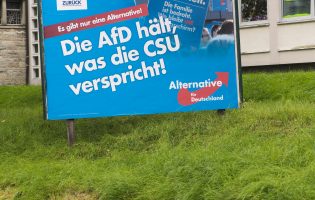AGI Receives $100,000 Funding to Study Apprenticeship Models in Europe and the United States
Washington DC, June 3, 2014 — The American-German Institute (AGI) announced today that it has received a $30,000 grant from Alcoa Foundation and a $70,000 grant from the Robert Bosch Foundation to study apprenticeship models. The study will identify best practices among employers, educators, and government that prepare the current and future workforce for careers in manufacturing and other advanced industries. The research will be conducted with the participation of the foundations in France, Germany, Hungary, the United Kingdom and the United States.
The grant from Alcoa Foundation will support local research starting this Fall, which will include the participation of the AGI network of experts. The resulting research will be published March 2015. The research will be based on expertise from each country’s apprenticeship programs, including the policy and programmatic challenges and opportunities; and inputs from those in industry, academia, the nonprofit sector and government. The research will help create a global “knowledge” network focused on apprenticeships in manufacturing, and inform a publication to be published by AGI that will profile each country’s apprenticeships. “AGI has explored the reasons behind the success of the “German dual system” in training and employing young workers,” said AGI President Jackson Janes, “and we aim to highlight best practices elsewhere in Europe in support of a new model in the United States.”
In addition to the Alcoa Foundation grant, the Robert Bosch Foundation will provide additional support for the site visits, assistance for publications that will offer recommendations for U.S. government, industry, trade unions, and educators, and a follow-on conference in Washington, D.C. that will include up to 50 attendees (including selected participants from the European site visits).
“Knowing what types of apprenticeship programs best prepare the workforce for successful careers in advanced industries can help overcome challenges tied to long-term workforce development,” said Greg Bashore, HR Director – US Primary Products and Global Primary Products at Alcoa. “By developing apprenticeship programs that are closely aligned with businesses, academics and labor leaders, we’ll have a demand-driven talent pipeline at local levels that can be sustained beyond short-term hiring needs.”
The outcomes of the research will help advance the goals of national workforce development efforts including President Obama’s Advanced Manufacturing Partnership (AMP) Steering Committee 2.0, a public-private partnership focused on leveraging emerging technologies to create high-quality manufacturing jobs and enhance America’s global competitiveness. As part of AMP 2.0, Alcoa, the Dow Chemical Company and Siemens have formed a coalition to build regional apprenticeship models and are creating a ‘how-to’ instruction manual to develop apprenticeship programs.
About AGI
For over 30 years, the American-German Institute (AGI) in Washington, DC has produced objective and original analyses of developments and trends in Germany, Europe, and the United States. AGI features high-level events with policymakers and business leaders as well as intimate, off-the-record roundtable discussions, which allow for a frank and open exchange across the Atlantic. AGI provides its constituency with a wide variety of analyses ranging from in-depth policy reports of a single issue of importance to Germany and the United States to salient essays on current events and relevant topics. Affiliated with Johns Hopkins University, the mission of AGI is to strengthen the American-German relationship in an evolving Europe and changing world.
About the Robert Bosch Foundation
The Robert Bosch Stiftung is one of the major German foundations associated with a private company. It holds 92 percent of the share capital of Robert Bosch GmbH. Established in 1964, it represents the philanthropic endeavors of Robert Bosch (1861-1942), focusing on the fields of science, health, international relations, education, society, and culture. In Stuttgart, the Foundation maintains the Robert Bosch Hospital, the Dr. Margarete Fischer-Bosch Institute for Clinical Pharmacology, and the Institute for the History of Medicine. Between 1964 and 2013, the Foundation has made available 1.2 billion euros for projects. In 2013, approximately 70 million euros were spent on project funding.
About the Alcoa Foundation
Alcoa Foundation is one of the largest corporate foundations in the U.S., with assets of approximately $470million. Founded 62 years ago, Alcoa Foundation has invested more than $590 million. In 2013, Alcoa Foundation contributed more than $22 million to nonprofit organizations throughout the world, building innovative partnerships to improve the environment and educate tomorrow’s leaders for careers in manufacturing and engineering. The work of Alcoa Foundation is further enhanced by Alcoa’s thousands of employee volunteers who share their talents and time to make a difference in the communities where Alcoa operates. Through the Company’s signature Month of Service program, in 2013, a record 62 percent of Alcoa employees took part in nearly 1,300 events across 24 countries, benefiting more than 505,000 people and 1,900 nonprofit organizations. For more information, visit www.alcoafoundation.com and follow @AlcoaFoundation on Twitter.








